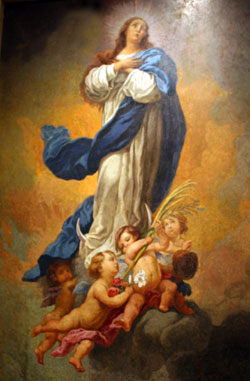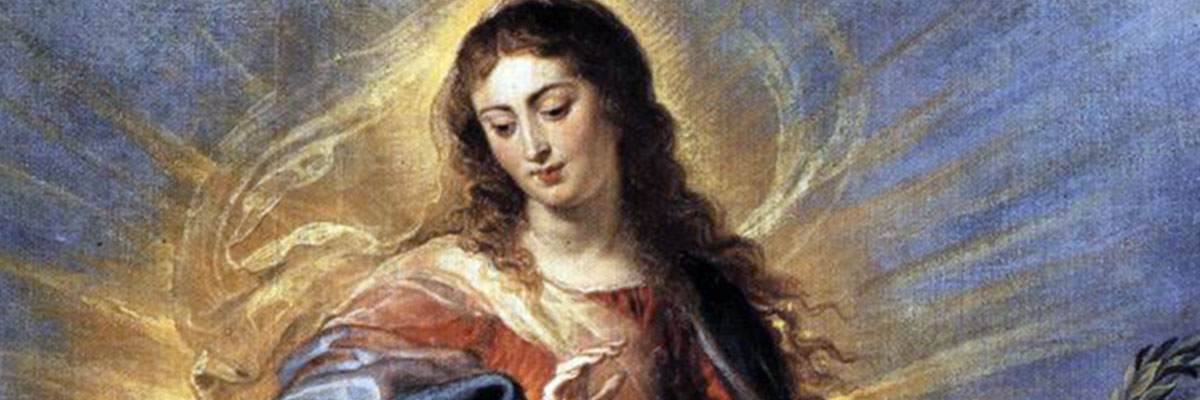Official Website of the
Catholic Diocese of Little Rock
Solemnity of the Immaculate Conception of the Blessed Virgin Mary
Monday, Dec. 9, 2019
Location: All Parishes
Although we celebrate the Immaculate Conception during Advent, the season during which we prepare for the birth of Jesus, this feast is NOT about the conception of Jesus. This can be confusing because the Gospel reading for this holy day focuses on the angel Gabriel appearing to Mary. "The angel said to her, 'Do not be afraid, Mary, for you have found favor with God. Behold, you will conceive in your womb and bear a son, and you shall name him Jesus.'" (Luke 1:30-31)
The Immaculate Conception refers to the conception of Mary, the mother of Jesus. The "immaculate" is not a reference to how she was conceived by her parents, Sts. Joachim and Anne. It acknowledges that God intervened and allowed her to be conceived without the stain of original sin.
 Normally, this feast is celebrated on Dec. 8 and is a holy day of obligation to attend Mass. But this year, it is NOT. "Since Dec. 8, 2019, is the Second Sunday of Advent, the Solemnity of the Immaculate Conception of the Blessed Virgin Mary is transferred to Monday, Dec. 9, 2019. The obligation to attend Mass, however, does not transfer. The optional memorial of St. Juan Diego Cuauhtlatoatzin, Dec. 9, is omitted this year," according to the U.S. Conference of Catholic Bishops. The offices of the Diocese of Little Rock are closed on this day.
Normally, this feast is celebrated on Dec. 8 and is a holy day of obligation to attend Mass. But this year, it is NOT. "Since Dec. 8, 2019, is the Second Sunday of Advent, the Solemnity of the Immaculate Conception of the Blessed Virgin Mary is transferred to Monday, Dec. 9, 2019. The obligation to attend Mass, however, does not transfer. The optional memorial of St. Juan Diego Cuauhtlatoatzin, Dec. 9, is omitted this year," according to the U.S. Conference of Catholic Bishops. The offices of the Diocese of Little Rock are closed on this day.
Simply Catholic gives a good explanation for this exception. "According to the Church’s canon law, the obligation to attend Mass is fixed to a date, not necessarily when the particular feast is liturgically celebrated. So, when Dec. 8 falls on a Sunday, the obligation to attend Mass on that date coexists with the obligation to attend Mass on Sunday. In this case, Dec. 8 is one of the Sundays of Advent, which take liturgical precedence over anything else on the liturgical calendar. Since the Church never wants to omit the liturgical celebration of the solemnity of the Immaculate Conception of the Blessed Virgin Mary, it is transferred to Dec. 9. The obligation, however, is not transferred to the temporarily given date for the celebration."
So why does the Church use the announcement of Jesus' birth as the Gospel for the feast of the Immaculate Conception? Before Gabriel tells Mary that she has been chosen to be the mother of Jesus, he greets her: “'Hail, full of grace! The Lord is with you.' But she was greatly troubled at what was said and pondered what sort of greeting this might be. Then the angel said to her, 'Do not be afraid, Mary, for you have found favor with God." (Luke 1:28-30)
The Catechism of the Catholic Church explains the significance of this greeting. "To become the mother of the Savior, Mary 'was enriched by God with gifts appropriate to such a role.' The angel Gabriel at the moment of the annunciation salutes her as 'full of grace.' In fact, in order for Mary to be able to give the free assent of her faith to the announcement of her vocation, it was necessary that she be wholly borne by God's grace. Through the centuries the Church has become ever more aware that Mary, 'full of grace' through God, was redeemed from the moment of her conception.
"That is what the dogma of the Immaculate Conception confesses, as Pope Pius IX proclaimed in 1854: 'The most Blessed Virgin Mary was, from the first moment of her conception, by a singular grace and privilege of almighty God and by virtue of the merits of Jesus Christ, Savior of the human race, preserved immune from all stain of original sin.'" (nos. 490-491. See also, nos. 721-726)




